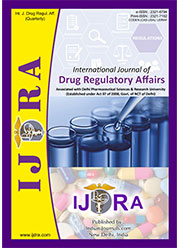Orphan Drugs Overview and Regulatory review procedure
Abstract
To treat, prevent, or diagnose a rare condition (such as Huntington's disease, myoclonus disease, Tourette syndrome, etc.), a treatment or vaccination is known as an orphan drug. Although the definition of uncommon diseases differs between countries, most take disease incidence, severity, and the availability of alternative therapy choices into account. The laws and policies that each area or nation adopts determine the laws and policies that apply to a rare disease. ODA (Orphan Drug Act, 1983) has been effectively promoting R and D investments to create new pharmaceutical products for the treatment of rare illnesses for the past 40 years. It has been implemented in a number of nations throughout the world (including the USA, Australia, the European Union, Japan, and others). Incidences of certain diseases have been rising faster than the rate at which new medications are discovered and developed. Most notably, it has been emphasised that China and India, the two most populous nations, lack national laws for orphan drugs and rare illnesses, which might have serious detrimental effects for their patient populations with uncommon diseases.
Downloads
References
2. Schieppati A, Henter JI, Daina E, Aperia A. Why rare diseases are an important medical and social issue. The Lancet. 2008 Jun 14;371(9629):2039-41.
3. Haffner ME. Adopting orphan drugs-two dozen years of treating rare diseases. New England Journal of Medicine. 2006 Feb 02;354(5):445-7.
4. Stakišaitis D, Špokienė I, Juškevičius J, Valuckas KP, Baiardi P. Access to information supporting availability of medicines for patients suffering from rare diseases looking for possible treatments: the EuOrphan Service. Medicina. 2007 Jun;43(6):441.
5. Wästfelt M, Fadeel B, Henter JI. A Journey of hope: lessons learned from studies on rare diseases and orphan drugs. Journal of internal medicine. 2006 Jul;260(1):1-0.
6. Smith, Sara H D, "Orphan Drug Development: Incentives Under the Orphan Drug Act". Senior Theses, Trinity College, Hartford, CT; 2015.
7. DiMasi JA, Hansen RW, Grabowski HG, Lasagna L. Cost of innovation in the pharmaceutical industry. Journal of health economics. 1991 Jul 1;10(2):107-42.
8. Eichler HG, Bloechl-Daum B, Brasseur D, Breckenridge A, Leufkens H, Raine J, Salmonson T, Schneider CK, Rasi G. The risks of risk aversion in drug regulation. Nature reviews Drug discovery. 2013 Dec;12(12):907-16.
9. Sharma A, Jacob A, Tandon M, Kumar D. Orphan drug: Development trends and strategies. Journal of Pharmacy and Bioallied Sciences. 2010 Oct;2(4):290.
10. U.S. food and drug administration [Internet]. USFDA. 2023 [cited 2023 Apr 07]. Available from:
https://www.fda.gov/
11. Trial Expert. Rare diseases: Registration & FDA support for orphan drugs [Internet]. Credevo Articles. Credevo Pte. Ltd.; 2019 [cited 2023 Apr 08]. Available from:
https://credevo.com/articles/2019/12/30/rare-diseases-registration-fda-support-for-orphan-drugs/
12. EMA. European medicines agency [Internet]. European Medicines Agency; 2023 [cited 2023 Apr 07]. Available from:
https://www.ema.europa.eu/en
13. EMA. Applying for orphan designation [Internet]. European Medicines Agency; 2018 [cited 2023 Apr 07]. Available from:
https://www.ema.europa.eu/en/human-regulatory/research-development/orphan-designation/applying-orphan-designation
14. PMDA updates [Internet]. Pmda.go.jp. [cited 2023 Apr 07]. Available from:
https://www.pmda.go.jp/english/int-activities/outline/0006.html
15. Davis S. Overview of orphan drug designation (odd) process in japan [Internet]. Globalregulatorypartners.com; 2014 Sep [cited 2023 Apr 07]. Available from:
https://globalregulatorypartners.com/wp-content/uploads/Overview-of-Orphan-Drugs-Designation-Process-in-Japan-sd.pdf
16. Therapeutic Goods Administration (TGA). Orphan Drug Designation [Internet]. Therapeutic Goods Administration; 2018 Aug 07 [cited 2023 Apr 07]. Available from:
https://www.tga.gov.au/resources/resource/guidance/orphan-drug-designation.
17. Gov.au. Guidance and resources [Internet]. Therapeutic Goods Administration; 2023 [cited 2023 Apr 08]. Available from:
https://www.tga.gov.au/
18. Franco P. Orphan drugs: the regulatory environment. Drug Discovery Today. 2013 Feb 1;18(3-4):163-72.
19. Blankart CR, Stargardt T, Schreyögg J. Availability of and access to orphan drugs: an international comparison of pharmaceutical treatments for pulmonary arterial hypertension, Fabry disease, hereditary angioedema and chronic myeloid leukaemia. Pharmacoeconomics. 2011 Jan;29:63-82.
20. Picavet E, Cassiman D, Simoens S. Evaluating and improving orphan drug regulations in Europe: a Delphi policy study. Health Policy. 2012 Nov 1;108(1):1-9.
21. Garau M, Mestre-Ferrandiz J. Access mechanisms for orphan drugs: a comparative study of selected European countries. OHE briefing. 2009 Oct 1(52).
22. Kamusheva M, Stoimenova A, Doneva M, Zlatareva A, Petrova G. A cross-country comparison of reimbursed orphan medicines in Bulgaria, Greece and Romania. Biotechnology & Biotechnological Equipment. 2013 Jan 1;27(5):4186-92.
23. Mitsumoto J, Dorsey ER, Beck CA, Kieburtz K, Griggs RC. Pivotal studies of orphan drugs approved for neurological diseases. Annals of Neurology. Official Journal of the American Neurological Association and the Child Neurology Society. 2009 Aug;66(2):184-90.
24. Stolk P, Willemen MJ, Leufkens HG. Rare essentials: drugs for rare diseases as essential medicines. Bulletin of the World Health Organization. 2006 Sep;84(9):745-51.
25. Fischer A, Borensztein P, Roussel C. The European rare diseases therapeutic initiative. PLoS Medicine. 2005 Sep;2(9):e243.

This work is licensed under a Creative Commons Attribution-NonCommercial 4.0 International License.
The International Journal of Drug Regulatory affairs require a formal written transfer of copyright from the author(s) for each article published. We therefore ask you to complete and return this form, retaining a copy for your records. Your cooperation is essential and appreciated. Any delay will result in a delay in publication.
I/we have read and agree with the terms and conditions stated Page 2 of this agreement and I/we hereby confirm the transfer of all copyrights in and relating to the above-named manuscript, in all forms and media, now or hereafter known, to the International Journal of Drug Regulatory affairs, effective from the date stated below. I/we acknowledge that the IJDRA is relying on this agreement in publishing the above-named manuscript. However, this agreement will be null and void if the manuscript is not published in the IJDRA.
Download link for COPYRIGHT FORM







